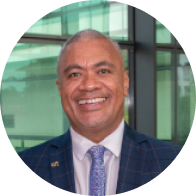AFI develops people, not just policies

, Director, Policy Programs & Implementation, AFI
Do you know what the following leaders have in common?
- Maha Bahou, CEO, Jordan Payments & Clearing Company
Beyond a deep commitment to financial inclusion, there is something else interesting: each of them, earlier in their career, served as a technical expert in an AFI Working Group.
Working Groups are often called the ‘content engine’ of the AFI network. They’re our primary mechanism for generating insight, knowledge exchange and peer learning. They serve as “communities of practice” on major financial inclusion issues and ultimately constitute the policy leadership of AFI.
I joined AFI 12 years ago, and still remember the early working group meetings: modest in size, yet rich in spirit. Back then, we were often unsure of the answers, but always certain of our purpose. We debated approaches, shared data, wrestled with policies, and in doing so, we grew. What I witnessed in those spaces wasn’t just policy development: it was people development.
Over the years, our working groups have benefited from some remarkable individuals, many of whom joined as technical experts and today lead institutions.
Just recently, I was filled with pride on the appointment of Aishath Asna Hamdi as Deputy Governor of the Maldives Monetary Authority. I know Asna well through her contribution to the Financial Inclusion Strategy Peer Learning Group (FISPLG). A quiet force of insight and integrity, she consistently brought grounded experiences and practical perspectives into our discussions. Her journey to deputy governor reflects both her personal commitment, and the enabling environment of peer learning that AFI fosters.
Increasingly, I’ve come to see the working groups as incubators of leadership. Sure, the knowledge shared around technical aspects of financial inclusion policy is invaluable, but what sets AFI apart is the social dynamic: the encouragement to speak up, the trust to exchange vulnerabilities, the opportunity to co-create.
I’ve seen how participating in an AFI working group cultivates influence and purpose. It gives people the confidence to lead in their own institutions, and the perspective to do so with inclusion and empathy.
The people I’ve mentioned are not isolated success stories. They are part of a wider pattern that speaks to AFI’s quiet, yet powerful, legacy. In every country, in every region, there are leaders whose voices were shaped around the AFI table. I’ve had the privilege to work with many of them from their early days – learning from them, just as they learnt from each other.
As individuals progress, so too do their institutions. Having their individuals participate in the AFI network lets organizations benefit from global peer learning, access to policy innovations. This builds their institutional capacity, reinforcing their leadership role in advancing financial inclusion at the national level.
As we look ahead to another year of AFI Working Group activities, I’m reminded that these spaces are much more than technical meetings. They are where tomorrow’s governors, ministers, and directors are being shaped. Which for me, is something truly worth celebrating.
You may also like...
Diddy's Legal Troubles & Racketeering Trial

Music mogul Sean 'Diddy' Combs was acquitted of sex trafficking and racketeering charges but convicted on transportation...
Thomas Partey Faces Rape & Sexual Assault Charges

Former Arsenal midfielder Thomas Partey has been formally charged with multiple counts of rape and sexual assault by UK ...
Nigeria Universities Changes Admission Policies

JAMB has clarified its admission policies, rectifying a student's status, reiterating the necessity of its Central Admis...
Ghana's Economic Reforms & Gold Sector Initiatives

Ghana is undertaking a comprehensive economic overhaul with President John Dramani Mahama's 24-Hour Economy and Accelera...
WAFCON 2024 African Women's Football Tournament

The 2024 Women's Africa Cup of Nations opened with thrilling matches, seeing Nigeria's Super Falcons secure a dominant 3...
Emergence & Dynamics of Nigeria's ADC Coalition

A new opposition coalition, led by the African Democratic Congress (ADC), is emerging to challenge President Bola Ahmed ...
Demise of Olubadan of Ibadanland
Oba Owolabi Olakulehin, the 43rd Olubadan of Ibadanland, has died at 90, concluding a life of distinguished service in t...
Death of Nigerian Goalkeeping Legend Peter Rufai

Nigerian football mourns the death of legendary Super Eagles goalkeeper Peter Rufai, who passed away at 61. Known as 'Do...



